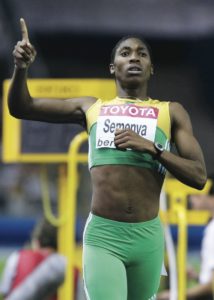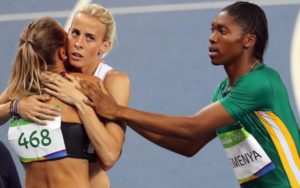REPORT: Britain’s Lynsey Sharp has commented on reports of multiple intersex athletes in the Olympic women’s 800m final, saying there were “obvious” rivals who made competing “difficult”.
Caster Semenya – who has sparked controversy over her hyperandrogenism, meaning her testosterone levels are higher than most women and more similar to men’s – won gold last night amid criticisms over the fairness of the race.
Sharp spoke out about the “difficulty” of competing with “the obvious” athletes in what she has previously called “two separate races”.
South African Caster, 25, was followed by Francine Niyonsaba of Burundi and Kenya’s Margaret Wambui – with Sharp finishing sixth, in a personal best of one minute 57.69 seconds.
Before the Rio 2016 Olympic Games, Sharp told The Daily Telegraph, there were “obvious” athletes with heightened testosterone amid rumours that there were two more hyperandrogenous competitors running in last night’s final.
“Everyone can see it’s two separate races so there’s nothing I can do,” she said earlier this summer.
“If you take away the obvious ones it’s actually really competitive,” she added. “For me, it’s not a new thing running against those girls. I’ve competed against Caster since 2008 so it’s nothing new for me.”

Caster Semenya of South Africa celebrates after she won in the women’s 800 metres final during the world athletics championships at the Olympic stadium in Berlin, August 19, 2009. REUTERS/Michael Dalder (GERMANY SPORT ATHLETICS) BEST QUALITY AVAILABLE
THE GUARDIAN: Indignation was swelling in Semenya’s breast. And when she let it rise, what poured forth was more than extraordinary. Asked how, exactly, she felt she had made a difference to her sport she replied: “I think it is all about loving one another. It’s not about discriminating against people. It is not about looking at how people look, how they speak, how they run, it is not about being muscular. It is all about sport. When you walk out of your apartment you think about performing, you do not think about how your opponent looks. So I think the advice from me to everybody is just to go out there and have fun.”
So many South Africans have united behind Semenya, using the twitter hashtag #handsoffcaster. Listening to her talk it was clear they are motivated by much more than chauvinism.
Inspiring as Semenya’s words were, the truth is that her competitors don’t all think like she does. Britain’s Lynsey Sharp, who finished sixth, was congratulated on Twitter by her team-mate, Nigel Levine, who wrote “Happy for Lynsey Sharp for coming 3rd in women 800m”.
Sharp, who wrote a paper on Semenya while she was studying at law school, has seemed to struggle to contain her emotions this week. On the BBC, Paula Radcliffe explained why she felt Sharp was so upset. “However hard she goes away and trains, however hard Jenny Meadows goes and trains, they are never going to be able to compete with that level of strength and recovery that those levels of elevated testosterone brings.”
Radcliffe said that Semenya and the other hyperandrogenic women should either “take the medication to suppress the levels, or they choose to have an operation or they choose not to compete”. Incredible as this sounds, Radcliffe is right that several hyperandrogenic athletes have undergone major surgery at the behest of athletics officials.
In 2013 it was revealed that four young female athletes from developing countries, all with atypically high but entirely natural levels of testosterone, were sent to a clinic in France where doctors proposed removing their gonads and partially removing their clitorises. All four agreed, and a year later they returned to competition.

